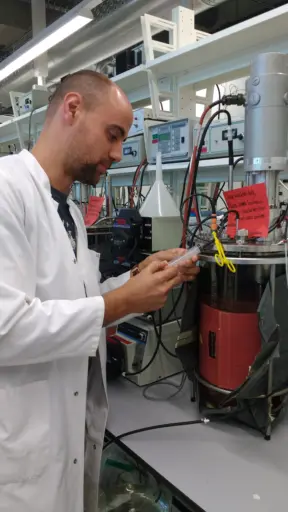Wastewater treatment plants have had a longstanding PR problem: People don’t like to think about what happens to the waste they flush down their toilets. But for many engineers and microbiologists, these plants have been a hotbed of scientific advances, which has even prompted their trade organization to propose a name change to “water resource recovery facility.”
That’s because wastewater from our sinks, toilets, showers and washing machines can be turned into valuable products with the help of scientists and unique bacteria, some of which weren’t even discovered—by pure chance—until the mid-1990s.
These latecomers to the research scene—anammox bacteria—are the subject of a new study led by Daniel Noguera and Katherine McMahon, professors of civil and environmental engineering at the University of Wisconsin-Madison. Results of their research appeared today (May 31, 2017) in the journal Nature Communications.
The bacteria’s name reflects their function: They turn ammonium into nitrogen gas under anaerobic (oxygen-free) conditions. Researchers and treatment plant operators alike have been excited about these microbes because they have the potential to save a great deal of money.
“Being able to remove ammonium anaerobically is pretty important because about 50 percent of a sewage plant’s operating cost is pumping oxygen into the water,” Noguera says. “Some of this oxygen is needed to remove ammonium with the conventional method.”
 Graduate student Christopher Lawson samples biomass at an anammox bioreactor at Radboud University in Nijmegen, The Netherlands. Photo courtesy of Christopher Lawson.
Graduate student Christopher Lawson samples biomass at an anammox bioreactor at Radboud University in Nijmegen, The Netherlands. Photo courtesy of Christopher Lawson.
But anammox bacteria don’t tackle their job in isolation. They are part of a complex community, similar—though composed of different members—to the microbiome in our gut that breaks down food and keeps us healthy in many other ways. This community was the subject of the new study.
“We knew very little about the role of the bacteria that co-exist in anammox granules,” Noguera says. “For the first time, our study identified detailed gene expression levels in these granules. This provides important clues on what the anammox bacteria and their partners might actually be doing and how they interact.”
These partners are called heterotrophs since they rely on the anammox bacteria—which are autotrophs (primary producers), like plants capable of photosynthesis—to turn atmospheric carbon dioxide into organic carbon. Among the most intriguing results of the new study are novel hypotheses for the exchange of biochemical material between these two groups of microbes.
The heterotrophs receive the organic carbon they need to grow from the anammox bacteria, in the form of several specific molecules the researchers discovered in the study. In return, the heterotrophs convert nitrogen into a form that anammox bacteria require for growth.
A conventional wastewater treatment plant converts ammonium, which is toxic to fish, into nitrogen gas and nitrate. Nitrogen gas is released into the atmosphere, while nitrate—an important plant nutrient—stays in the treated water. Regulations on the amount of nitrate that may be released vary by state, but excess amounts contribute to algal blooms in natural bodies of water, which may deplete oxygen levels for aquatic organisms.
An additional advantage of anammox bacteria, compared to conventional wastewater treatment, is that they convert a larger amount of ammonium to nitrogen gas.
Treatment plant operators now have to weigh the advantages of these new microbes against their implementation challenges. Anammox bacteria grow very slowly, taking about seven days to double in number, and require closely monitored oxygen and temperature cycles, which increases operational complexity.
But anammox reactors are not the only option for the treatment plant of the future to extract valuable resources from wastewater. In fact, some plants already produce more energy than they need to operate from the biogas that forms during the breakdown of organic material.
“Ten years from now, the typical treatment plant will probably look pretty different from today,” Noguera says. “Recovered resources may not only include clean water and energy, but also a variety of chemicals, such as fertilizers and precursors of plastics and fibers. As part of this evolution, I believe anammox reactors will soon become conventional.”
The UW-Madison team, which includes lead author Christopher Lawson, graduate student in civil and environmental engineering, and Joshua Hamilton, postdoctoral researcher in bacteriology, collaborated on the study with Ramesh Goel’s group at the University of Utah. The research was funded in part by the National Science Foundation (CBET-1435661, MCB-1518130) and a training fellowship from the National Sciences and Engineering Research Council of Canada.